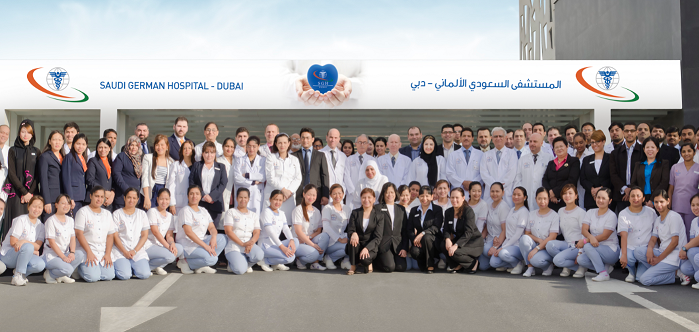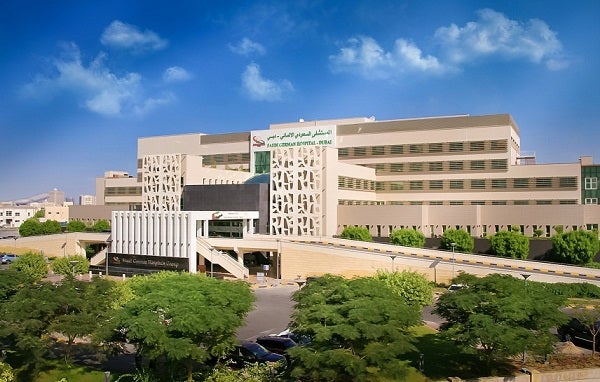Follow The Leader: Sobhi Batterjee, President and CEO, Saudi German Hospital President and CEO of Saudi German Hospital Group talks about his strategies for managing staff and driving a business' profit and social purpose.
By Fida Chaaban
Opinions expressed by Entrepreneur contributors are their own.
You're reading Entrepreneur Middle East, an international franchise of Entrepreneur Media.

"I don't want to talk about money. Who cares about that? Do you care? I don't. That's not why I'm here. That's not why we're all here. We're here to help people, our customers." If you want to talk about the for-profit health industry with the President and CEO of Saudi German Hospital Group, take it from me, you had better come up with a clever strategy beforehand. Sobhi Batterjee completely foils my plans, and summarily dismisses the idea that this interview should be about how you can make one of the most lucrative industries work for you. No, he won't talk to you about how his healthcare group turns an impressive profit across the GCC, and no he won't give you details about the cost of his newest venture in Egypt and what kind of feasibility studies were commissioned. He will however orate on everything from corporate social responsibility (It doesn't exist like that!). So scrap whatever ideas you have going in to meet Batterjee, and instead let him do what he does best: Lead.
Call this number right now, and tell him you have a problem, demands Batterjee gesturing toward a plaque fixed on the laboratory counter. We're at Saudi German Hospital in Dubai, and there is an organized bustle of staff, patients and their visitors, surrounding us. The plaque I admit that I thought this was a gimmick- has the direct mobile numbers of all the entire Saudi German Hospital (SGH) senior management team, including his own and that of his wife, Dr. Reem Osman CEO SGH Dubai. Batterjee insists that I test the numbers one by one from my own phone, and bids me to pretend that I'm a SGH customer with an issue. What happens? They all answer their phones, and only one of them seems somewhat reluctant to come to me personally to help me sort out my complaint.
The one senior staff member who does seem a tad displeased to hear from me doesn't have time to ask me more questions about my dissatisfaction with SGH service, because before he can probe any further Batterjee grabs my mobile and sarcastically asks the stunned head of staff if he is too busy to take care of SGH's clients before hanging up the call. The next thing I know, a well-heeled executive is tearing pell-mell down the hallway of SGH to apologize to the lively CEO, and assures him that it wasn't his intention to ignore a patient. These plaques are placed all over the hospital, and Batterjee shows me that yes, even in the elevators and in the waiting rooms, the chiefs of SGH staff are held responsible for patient satisfaction.

Basically, the for-profit healthcare sector is a lot like any other in that your customers are paying for services, and they had better feel that they are getting their money's worth. "Our business is to help people. They can call me, all of the customers that we have can. And if something is wrong, I will fix it," he says promising. Happy customers with money to spend on better healthcare translates into referrals of more happy customers with money to spend on healthcare. From what I can tell by observing Batterjee's managerial style, his company runs like a machine with cogs and wheels that all serve to churn out the end game -profit– while making their clients happy.
Batterjee, an engineer by education, is the first person to admit that healthcare is "foreign" to him. "I'm not a doctor, but I love this business. You know what it's like when we have a lady who couldn't have children before and we help her to create a family? You know, we had an Emirati boy who couldn't walk- he tried everywhere before us. Now he can," says Batterjee smiling. He is theatrical (in a good way), bold (like most effective leaders), and basically either the CEO of your dreams (if you perform up to his standards), or your worst nightmare (if you demonstrate a lack of interest or passion toward SGH). "When patients call me, I connect the CEO of the hospital and the doctor in charge. The patient tells them about the problem. This process works because my staff realize that I am always available, leading them to take better care of the patient. When the man in charge is accessible, it's a fantastic culture," he says continuing to discuss his particular checks and balances system. He calls SGH patients his "representatives", and says it encourages both clientele and staff to act like owners of the institutions.
"These are my customers and these are their needs. The people who call my phone from the public listing, they are Type-A personalities. They are driven and detail-oriented, and these are the people that are watching the logistics and efficacy of SGH for me. There is no room for human error in the healthcare system- it's not the type of industry [where] mistakes are admissible. No one in our Group is allowed to keep their mobile number private. You, and everybody else, are 24-hours a day on your toes. There is no rest-time in medicine, in my organization you can be called at any time. Your time is the patient's time. I want people who take the mission seriously, and I try to drive that spirit here."

Driving the spirit is also on the agenda of Batterjee's wife, Dr. Osman. He is confident that "she will be the most influential Arab woman in the health industry in two to three years. Mark my words." He is a firm believer in people shaping their own levels of success, and says that he considers himself downright lucky: "Allah has blessed me to work in this field. After 42 years, I am still as passionate as I was the first day. I've seen people pay me $100,000 and hug me." What he means by this is that SGH clients are comfortable parting with their money due to the results they garner and the high level of customer service care they are afforded. "I want to build as many hospitals as possible and treat as many people as possible. Last year we treated two million people, and approximately 150,000 surgeries. To me, that's an achievement."
The numbers are impressive: "I have treated at least 500,000 people in Yemen. I have saved at least 5,000 young children from death due to heart malfunctions... we have many stories like this. So this is why money doesn't matter- achievement does." The healthcare group is launching their Egyptian endeavor next year, and Batterjee says that I'll have to come and see it for myself. I just might do that since he throws my understanding of Middle East profit-margins for a loop, scoffing at my logic (and lack thereof). "Do you know how many people are in Egypt? Think of the volume, and yes, they can pay- you're talking 80 million! If I target 2% of them it's half the population of Oman. Do you know how many people are in Saudi? If only a fraction of Egyptians visit our new hospital, it will be lucrative and more so than any of our Saudi hospitals."
I had questioned the sense of such a large investment in Cairo, especially in light of the current political shenanigans, and he is quick to negate this: "Temporary. This is all going to over soon and Egypt will be a booming economy- you watch." Pointing out the Kingdom's unmatched GDP, I try to hold my own with Batterjee. "This is ridiculous. You should go beyond the figures. If you think you know about healthcare and money, you don't."

Indeed, there are many things in the healthcare sphere that I don't know, and corporate social responsibility is apparently one of them. After 30 minutes of listening to SGH's animated President, I also start to reconsider how modern day companies approach CSR. "This is a big subject. For God's sake, there is no longer anything called corporate social responsibility! It's like saying I'm going to send a fax- it's outmoded. CSR is a method of polishing a company's image. Emaar for example, can build homes for the less fortunate. They can leverage their power, weight, and development to bring costs down by building nice, functional, affordable homes.
This is sustainable and that is social business- it's not a temporary thing like CSR. It's a sustainable model that can push society forward. If a new person joins, they can scratch any CSR program they don't like off the agenda overnight. There's no CSR these days, but there is social business and this is run by social entrepreneurs. Social business means creating a business for the community that is sustainable." Here Battarjee goes into a rather long explanation about how large-scale money-making corporations need to re-evaluate their priorities and whether or not they actually want to help society, as opposed to just white-washing their images.
He defines social business as "a separate entity away from the mother company, functioning on its own, that provides services and products that are low-cost that can help less fortunate people. I use my engineers and my architects- we are a healthcare developer not just hospital operators- we design hospitals, we build them, we equip them, we staff them, we operate them, and we own them. So I can use that organizational knowledge to develop low-cost hospitals. These hospitals won't have the finishings of SGH nor the luxury, just the minimum needed to concentrate on healthcare items- that brings the cost down. I will concentrate only on primary and secondary care, which is the less-complicated and less-expensive things. I will get medicines free of charge, because I buy medicines for my organizations in big amounts and I tell my suppliers, "Look, you're going to give me medicines free of charge for this social business.'"
Batterjee says that while it has nothing to do with SGH and that the institution's name will not appear, he's adamant that it needs to be done, and he's got the resources and human capital to make it happen: "I'll use some of my staff to donate time free of charge, I'll use some of our construction suppliers to give me materials at 50% cost because we buy bulk from them for our for-profit hospitals, but here I tell them this is for Allah's sake."
Perhaps the most important thing that Batterjee stressed on is that the bigger the company, the more they can use that to mitigate how much social business gets done: "This is about using your organizational equity, brand name, economy of scale, to build another hospital that is low cost that can give consultation to the less fortunate people, and instead of taking 600 Dirhams for this service, we can give it to the patients for 10 Dirhams. That is called social business- and that is the new way of the world. That will create jobs, that will treat people, and it will give them products or services."
Creating jobs, treating people, and doing it all under a sustainable business model. That's SGH in a nutshell, and the for-profit side isn't the only healthcare arena worth examining in this context. It can, according to Batterjee, work and it can work well. It just takes the right hand behind it all to make it happen... both economically and ergonomically. Besides, isn't that what good engineering is all about?













